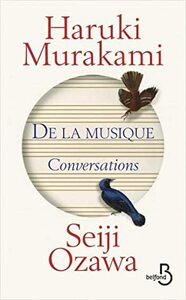Take a photo of a barcode or cover
Conversas entre Seiji Ozawa e Haruki Murakami, falando sobre música clássica. Não tinha como eu não gostar, eu acho.
Tem muitos insights sobre como é ser uma pessoa com a vida totalmente imersa em música. Também sobre vários músicos e vários maestros. Terminei o livro gostando ainda mais do Seiji Ozawa! Uma coisa bem interessante é que a conversa passa por vários concertos, dos mais variados compositores, e tem uma playlist no spotify! O livro chama a atenção disso, achei um toque fenomenal!
Tem muitos insights sobre como é ser uma pessoa com a vida totalmente imersa em música. Também sobre vários músicos e vários maestros. Terminei o livro gostando ainda mais do Seiji Ozawa! Uma coisa bem interessante é que a conversa passa por vários concertos, dos mais variados compositores, e tem uma playlist no spotify! O livro chama a atenção disso, achei um toque fenomenal!
Any chance you get to listen to a pair of brilliant artists discuss art at-length, take it.
emotional
informative
lighthearted
slow-paced
pretty interesting, informed me on a lot of classical stuff I didn’t know. wish they talked longer about jazz, given murakami’s previous work, but understandable given ozawa’s expertise.
Pretty exciting stuff if you are into at least two of: classical music, Murakami, and Ozawa. Probably hard to got too fired up about otherwise.
A wonderful way to explore classical music. I enjoyed the conversational format. It was interesting to “hear” Huraki rather differently than his novels and similarly to hear from Seiji directly - the man behind the music.
This was honestly one of the driest books I have ever read.
I am a music fan, and I am a Murakami fan. Somehow these two combined was just an incredibly dry and boring book.
This was quite possibly the definition of a niche book.
Would only recommend if you eat, breath, and sleep Murakami.
2.5/5
I am a music fan, and I am a Murakami fan. Somehow these two combined was just an incredibly dry and boring book.
This was quite possibly the definition of a niche book.
Would only recommend if you eat, breath, and sleep Murakami.
2.5/5
Murakami starts off describing himself as an amateur who knows little about classical music. This is very wrong. He has an obvious deep knowledge from a historical standpoint and as a listener. He may not read music or play an instrument, but his musical knowledge made his Seiji Ozawa interviews very smart and informative, and he often challenged Ozawa in ways that turned the conductor introspective. I would only recommend this book to someone who is very familiar with Seiji's career and who has a very wide understanding and exposure to classical music. Next time I read a Murakami book when he refers to a classical piece of music (which he certainly will), I will have a greater respect for how that music becomes a character in his story.
emotional
informative
inspiring
reflective
medium-paced
the in depth orchestra talk went over my head but still really cool & made me appreciate classical music/conducting alot more. two very insightful people!
2 cool quotes-
OZAWA: Even at my age, you change. And practical experience keeps you changing. This may be one of the distinguishing features of the conductor's profession. The work itself changes you. Of course the one thing that any conductor has to do is to get sounds out of the orchestra. I read the score and create a piece of music in my mind, after which I work with the orchestra members to turn that into actual sound, and that process gives rise to all kinds of things. There are the interpersonal relationships, of course, and also the musical judgments you make when you decide which particular points of the work you want to emphasize. There are times when you look at the music and really focus on the long phrases, and, conversely, times when you split haits over the tiny phrases. You also have to decide which of these various tasks you are going to favor. Each of these experiences will change a conductor. I got sick, went into the hospital, and stayed away from conducting for a long time. But then recently I went to New York and had a burst of conducting. Then I came back to Japan, and because I had nothing else to do at New Year's, I listened to recordings of those Saito Kinen performances over and over again.
I learned a lot from them. (226)
MURAKAMI: It's true in just about any field in Japan.
Maybe even in writers circles. People can't do anything until they've gauged the opinions of the other people present. They look around, they absorb the atmosphere, and only then do they raise their hands and say something unobjectionable. That way, there's no progress where it matters, and the status quo becomes set in stone. (320)
2 cool quotes-
OZAWA: Even at my age, you change. And practical experience keeps you changing. This may be one of the distinguishing features of the conductor's profession. The work itself changes you. Of course the one thing that any conductor has to do is to get sounds out of the orchestra. I read the score and create a piece of music in my mind, after which I work with the orchestra members to turn that into actual sound, and that process gives rise to all kinds of things. There are the interpersonal relationships, of course, and also the musical judgments you make when you decide which particular points of the work you want to emphasize. There are times when you look at the music and really focus on the long phrases, and, conversely, times when you split haits over the tiny phrases. You also have to decide which of these various tasks you are going to favor. Each of these experiences will change a conductor. I got sick, went into the hospital, and stayed away from conducting for a long time. But then recently I went to New York and had a burst of conducting. Then I came back to Japan, and because I had nothing else to do at New Year's, I listened to recordings of those Saito Kinen performances over and over again.
I learned a lot from them. (226)
MURAKAMI: It's true in just about any field in Japan.
Maybe even in writers circles. People can't do anything until they've gauged the opinions of the other people present. They look around, they absorb the atmosphere, and only then do they raise their hands and say something unobjectionable. That way, there's no progress where it matters, and the status quo becomes set in stone. (320)




